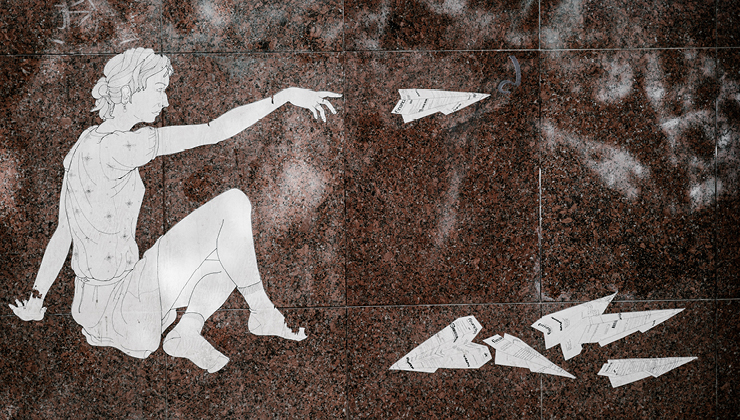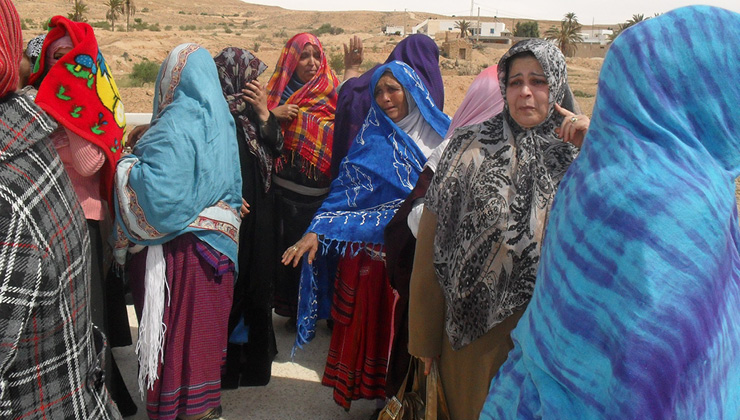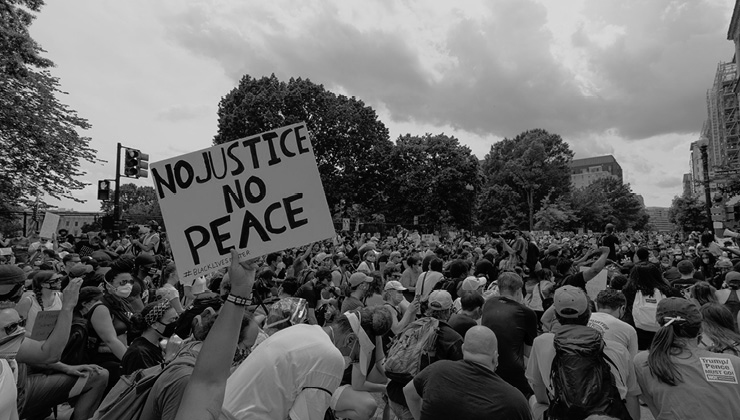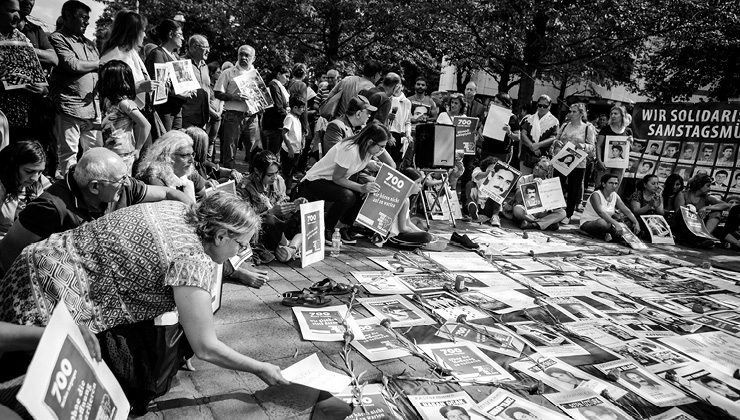Psychologist Dr Kawkab Alwadeai shares the stories of people she has supported, and of her concerns about Yemen’s capacity to deal with the psychological damage caused to the population living under airstrikes.
This post contains descriptions of injury and trauma that may be distressing.
26 March 2015 is an unforgettable night. It was 2:30am and I woke to the sound of bombing. At first I thought it was fireworks Yemenis use to celebrate but then pulled the curtain back and saw the sky burning. I turned on TV to watch the breaking news – the Saudi envoy to Washington was announcing the formation of a coalition. They were launching a war in Yemen against Houthi forces and the former President Ali Abdullah Saleh, to restore the Abd Rabo Mansour Hadi government. I felt anger, fear, anxiety, wonder and astonishment. It is very difficult to wake up and find missiles from ten countries targeting your country, your life and your future.
Film: Explosion and shockwave after Saudi Airstrike on Sanaa
The next day I started receiving calls. I was the Psychological Counsellor for United Nations agencies and their families in Yemen and UN staff needed psychosocial support. They were terrified by the violent explosions. It was the most difficult situation of my life. I took a deep breath and focused. All I could do was provide them with basic guidance like “Put headphones on your children ears”, “Turn on the TV and raise the volume”, “Let children watch cartoons”.
I always urged parents to avoid showing their concerns to their children. I used to tell them “you will not suffer any harm, they only target military camps”. I did not realise that the coalition’s aircrafts were flying over Sana’a.
A missile was fired into a residential neighbourhood near Sana’a International Airport. It destroyed 14 houses, including the home of my great aunt’s family. Her son’s pregnant wife and their four daughters were buried under the rubble of the house they built after leaving their village in Hajah governorate, longing for a better life for their children.
Two children survived: Osama (13) and Ibtisam (12). The missile force tossed them from their house. Rescuers transported them to different hospitals. Ibtisam said “I was sleeping when I felt thirsty, I woke up to find the blood covering me and not one of my sisters was beside me. All houses were destroyed, and the sky was red like the fire.”
I can’t describe my feelings in that moment. The tragedy and disaster are indescribable. Two wounded, shocked children lost their parents, four sisters and an unborn brother. The grandparents who lost their son, daughter-in-law and granddaughters. They remained alive to mourn their luck, cry their catastrophe and blame themselves for being alive. Their lives were now buried in the rubble with the memories of their beloveds. Those who used to fill their life with happiness now laid in tombs. As a doctor, I asked myself “what psychosocial support can I give them? I can only let them live their shocks, sadness and sorrows and let them cry as much as they wish.” What I remember of that day is the petrified tears I could not cry.
I received another call. “I can’t sleep at night. Eleven of my relatives and neighbours in Taiz and Aden were killed. My family is confined in their houses and Katyusha rockets are falling over them. They are without food and water and if they go out they will get sniped.”
Huthis and Saleh destroyed Yemeni national spirit after their march to the southern region, leaving behind them the dead and wounded, and psychological pains and social crisis that won’t recover easily.
On the fourth day of the war, a girl underwent a kidney transplant. Her mother trembled with fear for her daughter’s life. I held her hand to ease the anxiety and with each missile strike my heartbeat increased. The transplant succeeded, and lack of medication became the greatest threat to her daughter’s life. Luckily, she was working with the UN and could get medicine that arrived on their plane from Djibouti. Most Yemenis with chronic diseases have died during the war because of the lack of medicine.
The first 7 months of the war were the most horrific. The coalition‘s strategy was to bomb and fly closely overhead, to frighten people with the sounds of warplanes. This psychological terror waged by the Saudi coalition against civilians has led to heart attacks, sleep disturbances, panic attacks, nervous cramps, fainting, insomnia, nightmares, stress and diabetes. Many families have been displaced. Others stay indoors out of fear. Without electricity, TV or social activity, this has greatly affected their psychological state and they are prone to mental disorders. The most common symptoms among children are urination, nightmares and violence. These symptoms intensify when children see aircraft bombing homes, hospitals, military buildings and factories amid residential neighbourhoods.
Some are living in the horror of exploding weapons stores destroying houses (Film: Air Strike on Missile Base in Yemen Capital Causes Huge Explosion). The two largest explosions were caused by the bombings of weapons stores in Faj Utan and Nokum Mountains – killing dozens of civilians and destroying their homes. In one of these explosions, my brothers’ homes and my apartment building were damaged. I was forced to move, but we had escaped death.
Two girls asked me to convince their mother to let them attend a friend’s wedding. She was worried about airstrikes, she couldn’t accept the idea of her daughters dying while dressed up with makeup on. She wondered about rescuers finding them dressed up or maybe naked due to the explosions. I calmed her by saying “do not worry … if an airstrike happened then your daughters’ bodies will be charred or they will be separated parts, and rescuers will not find anything to enjoy watching.” She laughed and allowed them to attend the wedding.
Wedding parties are the only outlet for Yemeni girls to show their beauty, fashion, makeup skills and to dance. They are the best activity during airstrikes, as music and colourful Yemeni clothes make women forget the war and enjoy life.
Some trauma cases require psychiatric help. During the shelling of a residential neighbourhood in Sana’a, a man asked me to give psychosocial support to his relative. During an explosion, she lost one of her hands while holding pieces of her baby’s body in the other. I recommended he seek help from a psychiatrist first. The role of psychologist would come after.
These cases have inspired me and given me the strength to continue providing psychological support, to help others to continue normal lives whilst accepting death at any moment.
War in Yemen is in its third year, and the bombings and killing continues. Every day psychological pains grow. Individuals who have lost their family, those who have lost limbs, widows, orphans, bereaved parents suffer psychological pain and post-traumatic stress. They need help from trained specialists, psychologists and psychiatrists. Unfortunately, Yemen lacks the experience needed to deal with deep trauma cases.
The views, thoughts and opinions expressed in this blog post are those of the author(s) only, and do not reflect LSE’s or those of the LSE Centre for Women, Peace and Security.
Image credit: Annie Spratt on Unsplash





